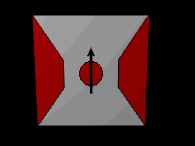
Materials Research Science and Engineering Center: Faculty Publications
Document Type
Article
Date of this Version
12-3-2003
Abstract
The role of disorder in magnetic ordering transitions is investigated using mechanically milled GdAl2. Crystalline GdAl2 is a ferromagnet while amorphous GdAl2 is a spin glass. Nanostructured GdAl2 shows a paramagnetic-to-ferromagnetic transition and glassy behavior, with the temperature and magnitude of each transition dependent on the degree and type of disorder. Disorder is parametrized by a Gaussian distribution of Curie temperatures TC with mean TC and breadth Δ TC. A nonzero coercivity is observed at temperatures more than 20 K above the highest TC of any known Gd-Al phase; however, the coercivity decreases with decreasing temperature over the same temperature range where the GdAl2 grains ferromagnetically order. Models for the anomalous coercivity behavior are proposed and evaluated for their ability to explain the origin of the low-temperature glassy magnetization peak.


Comments
Published in Physical Review B, 68, 214404 (3 December 2003)
Copyright © 2003 The American Physical Society. Used by permission
URL: http://link.aps.org/abstract/PRB/v68/e214404
doi:10.1103/PhysRevB.68.214404